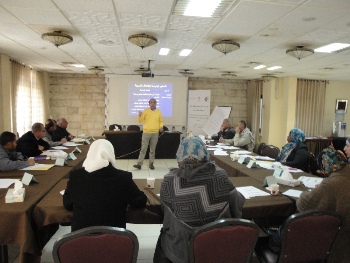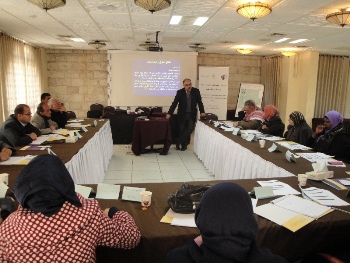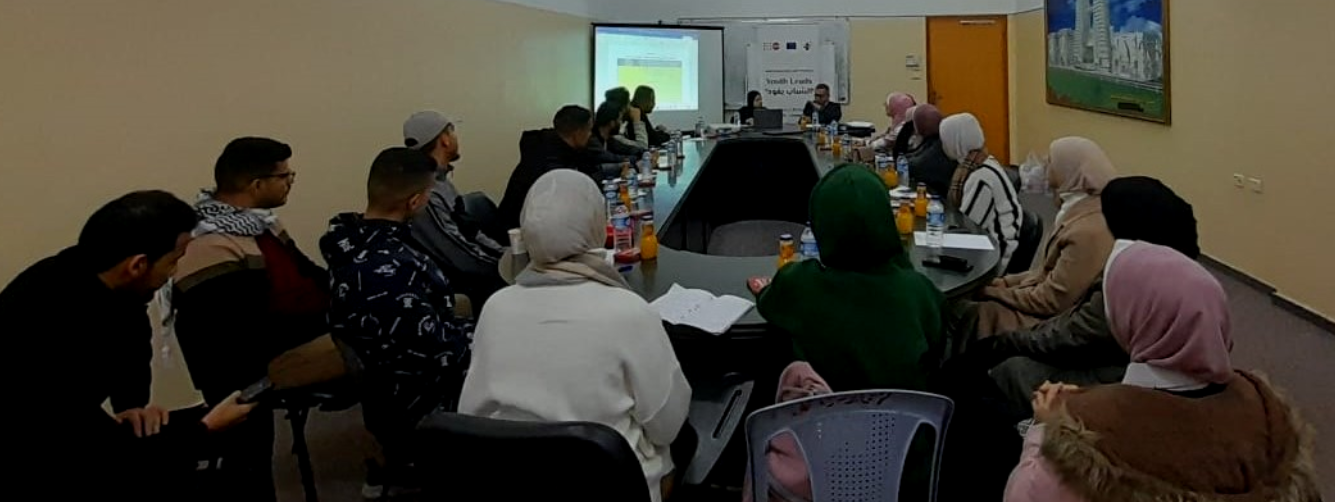
Ramallah – Member of the Tammoun municipal council Dalal Bsharat says she still feels the positive impact from a training workshop she recently attended. The training, conducted by MIFTAH in cooperation with the Ministry of Local Government, was aimed at capacity-building among members of local councils on matters pertaining to local government policies, development and architectural planning. “The results of the training were more than I had expected,” Basharat says. “It broke the fear barrier in me. I wasn’t able to take any decisions on my own previously, but now things are much better. I feel strong.”
Ahmad Kharoub, member of the Hableh municipal council in the Qalqilya area, said the training offered him information on how to revive his own role in the council. He said he is now more capable of dealing with and addressing citizens. “It was more than I had expected,” he said. “The trainers were highly experienced and gave us in-depth information about planning, laws, legislations, water resources and other topics related to our work as members at Local government units.”
The training tackled subjects such as strategic planning, structural plans, roads, the environment and relevant laws, all of which highlighted the participants’ understanding of the added value of strategic participatory planning and its ramifications on the management of municipalities and councils from a monitoring perspective. Subjects such as building organization and the legal involved in addition to land ownership and structural plans were also discussed.
The participants representing LGU members from both Qalqilieh and Tubass districts, were given specialized technical needed information on the laws relevant to local governance in Palestine, particularly those pertaining to municipalities and village councils. The trainers, including Osama Saleh and Khaled Talahmeh, talked about the jurisdictions of the councils and ministries and the mechanisms for dealing and coordinating with them, subjects which the participants contributed to as well.
The training also deepened their concept of leadership skills in terms of certain issues linked to future development and strategic projects. The role of local council members in preparing budgets was addressed in addition to finding realistic solutions to the everyday problems facing these councils as memebers in terms of infrastructure, plans and development with the goal of providing the best possible services to the citizens. Additionally, the training addressed the need to merge women into the administrative field including in planning, organizing, coordinating and monitoring.
One recommendation proposed by the participants was to prepare a guidebook for a strategic development and planning program. They also proposed a feasibility study for the sewage problem in their villages and towns in addition to furthering the members’ information, including legal, on developmental planning.
MIFTAH coordinator Hanan Saeed said the six-day training targeted 21 male and female members of local councils in the Tubas and Qalqilya districts and was aimed at raising awareness among the local council members on the technical and legal aspects of their work. Saeed also said the training was focused on reviving these council members’ role so they could have more of an interactive role in dealing with their local communities’ issues.

MIFTAH Program Director Lamis Shu’aibi said the training is part of MIFTAH’s ongoing women and youth empowerment program which aims to build community and political leaders capable of bringing the needs and priorities of society to the fore. In this case, it is through targeting male and female local council members to equip them with technical and specialized information on issues pertaining to the laws, policies and strategic approaches of local government.
Shuabi stressed that social capital is used to create an interactive framework in communities in order to push the communities’ priorities and issues towards decision makers. This in turn, can encourage the development of public policies responsive to the needs of citizens, including marginalized sectors. “Investing in potentials and training local council members is a guarantee for the continuation of the presence of community leaders with an active role in their communities and in Palestinian society at large. They will be able to respond to the needs of citizens even after their time in office has ended” she said.
Head of the local government directorate in Nablus Sameer Dawabsheh commended MIFTAH’s interventions, saying he would like to see more of the same, calling them ‘unique and qualitative.” Dawabsheh added that the partnership between MIFTAH and the Ministry of Local Government was a longstanding one, based on equality and communication in developing the role of local council members.







